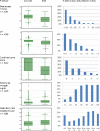Predicting the clinical outcome of severe falciparum malaria in african children: findings from a large randomized trial
- PMID: 22412067
- PMCID: PMC3309889
- DOI: 10.1093/cid/cis034
Predicting the clinical outcome of severe falciparum malaria in african children: findings from a large randomized trial
Abstract
Background: Data from the largest randomized, controlled trial for the treatment of children hospitalized with severe malaria were used to identify such predictors of a poor outcome from severe malaria.
Methods: African children (<15 years) with severe malaria participated in a randomized comparison of parenteral artesunate and parenteral quinine in 9 African countries. Detailed clinical assessment was performed on admission. Parasite densities were assessed in a reference laboratory. Predictors of death were examined using a multivariate logistic regression model.
Results: Twenty indicators of disease severity were assessed, out of which 5 (base deficit, impaired consciousness, convulsions, elevated blood urea, and underlying chronic illness) were associated independently with death. Tachypnea, respiratory distress, deep breathing, shock, prostration, low pH, hyperparasitemia, severe anemia, and jaundice were statistically significant indicators of death in the univariate analysis but not in the multivariate model. Age, glucose levels, axillary temperature, parasite density, heart rate, blood pressure, and blackwater fever were not related to death in univariate models.
Conclusions: Acidosis, cerebral involvement, renal impairment, and chronic illness are key independent predictors for a poor outcome in African children with severe malaria. Mortality is markedly increased in cerebral malaria combined with acidosis. Clinical Trial Registration. ISRCTN50258054.
Figures
References
-
- Olliaro P. Editorial commentary: mortality associated with severe Plasmodium falciparum malaria increases with age. Clin Infect Dis. 2008;47:158–60. - PubMed
-
- Dondorp AM, Lee SJ, Faiz MA, et al. The relationship between age and the manifestations of and mortality associated with severe malaria. Clin Infect Dis. 2008;47:151–7. - PubMed
-
- World Health Organization. Severe falciparum malaria. Trans R Soc Trop Med Hyg. 2000;94(Suppl 1):1–90. - PubMed
-
- Beare NA, Southern C, Chalira C, Taylor TE, Molyneux ME, Harding SP. Prognostic significance and course of retinopathy in children with severe malaria. Arch Ophthalmol. 2004;122:1141–7. - PubMed
-
- Bell DJ, Molyneux ME. Treatment of childhood Plasmodium falciparum malaria: current challenges. Expert Rev Anti Infect Ther. 2007;5:141–52. - PubMed



